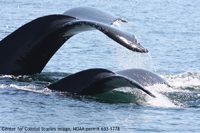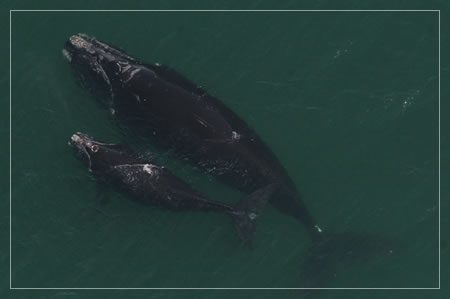Tuesday, March 18, 2014
FOR IMMEDIATE RELEASE:
Center for Coastal Studies contact:
Jooke Robbins, PhD
[email protected]
Cathrine Macort
+1-508-487-3622 x103
+1-508-808-9660
[email protected]
 Scientists have developed the first DNA-based test for estimating the age of humpback whales, based on decades of population studies off New England and recent advances in human medicine. The research was conducted by the Australian Antarctic Division, in collaboration with the Center for Coastal Studies (Provincetown, Massachusetts), and the Australian Genome Research Facility.
Scientists have developed the first DNA-based test for estimating the age of humpback whales, based on decades of population studies off New England and recent advances in human medicine. The research was conducted by the Australian Antarctic Division, in collaboration with the Center for Coastal Studies (Provincetown, Massachusetts), and the Australian Genome Research Facility.
The method looks at age-related changes in the DNA of skin samples that can be collected from living whales with minimal disturbance.
The new test relies on changes in the ‘DNA methylation’ of genes involved in the ageing process. DNA methylation is a biochemical process where a methyl group (CH3) is added to specific DNA building-blocks. This process alters the expression of genes.
“We used information on age-associated DNA methylation in human and mouse genes to identify similar gene regions in humpback whales.” said Dr Simon Jarman, a molecular biologist with the Australian Antarctic Division. “We then developed an assay using three of the most informative methylated genes, which estimates age with a high level of precision.”
The approach had to be calibrated with samples from humpback whales of known age. Prior to this study, the only way to know the exact age of a living humpback whale was to keep track of individuals from their year of birth. Validation therefore depended on research by the Center for Coastal Studies (CCS) in the Gulf of Maine, where individual humpback whales have been studied for more than three decades.
“Long-term studies have already unlocked many mysteries of this long-lived, cryptic species,” explained Dr. Jooke Robbins, co-author of the study from CCS. “They have been particularly important for developing and ground-truthing new molecular techniques.”
Two other humpback whale aging methods have been tested with CCS data, but this one is the most precise and the only one that reflects chronological age in any humpback whale, regardless of its population or habitat. This is also the first application of this particular approach in any wild animal species.
“The ability to age any humpback whale from a skin sample will have tremendous implications for studies of the biology and ecology of this species,” explained Dr. Robbins. “It will raise the level of basic knowledge across populations and advance understanding of fundamental things like life span and recovery status. Some of the most important questions that we face in the study and conservation of this species can be informed by a systematic aging technique.”

Our Work
Humpback Whale Research
Right Whale Research
Marine Animal Entanglement Response
Marine Geology Department
Water Quality Monitoring Program
Marine Fisheries Research
Seal Research
Shark Research
Marine Education
Interdisciplinary
Marine Debris and Plastics Program
Marine Policy Initiative
Cape Cod Climate Change Collaborative
Publications

